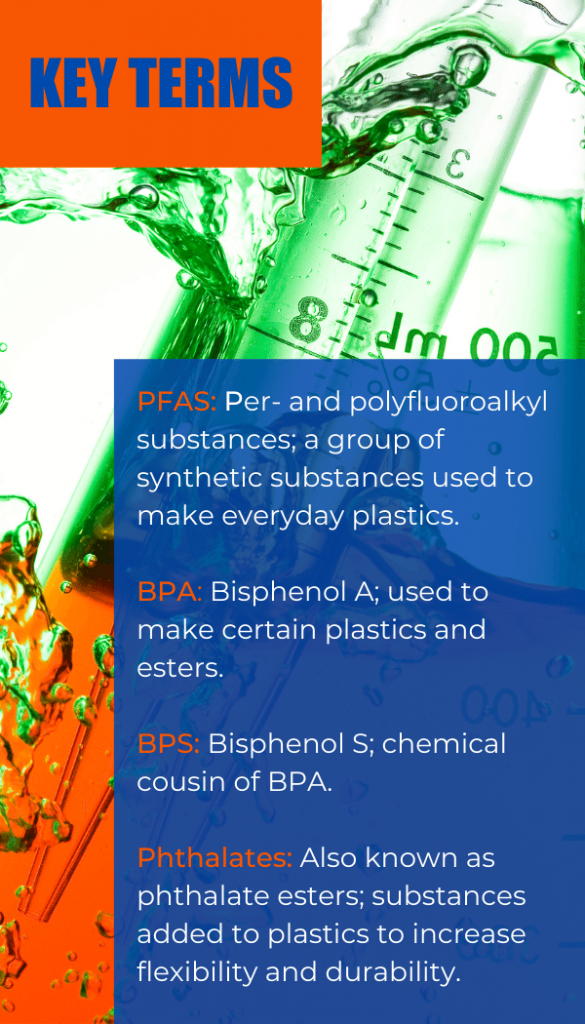“The Potential Irreversible Health and Environmental Impact Must Be Taken Seriously”
Fast food giant McDonald’s recently announced that they will be eliminating all PFAS substances from their packaging by 2025. The change has come as a result of the efforts from a number of chemical safety petitioners and NGOs, including Safe Chemicals Healthy Families and their ‘Mind the Store’ campaign.
PFAS, commonly referred to as ‘forever chemicals’, many of which are used to manufacture plastics, refers to thousands of chemicals belonging to a single chemical class: per- and polyfluoroalkyl substances.
In food packaging, PFAS provides waterproof, stain-proof, and grease-proof properties, and are therefore a popular choice for the food and grocery industries. They are also used for a variety of purposes other than food packaging, including fire fighting foam and pesticides, and they are persistent, mobile chemicals which do not break down in the environment.

“As population and consumption continues to rise, so does plastic and chemical pollution,” says Julie Andersen, CEO of Plastic Oceans International. “The potential irreversible health and environmental impact must be taken seriously. We need corporate accountability by all. We need to make sure that the benefits of a product outweighs its human and environmental cost, not just profit.”
Stemming from demands for the banning of PFAS are strong signs of constructive change. Alongside McDonald’s, several US and international fast food chains have already committed to phasing out PFAS from their packaging, including Cava, Chipotle, Panera, Sweetgreen, and Taco Bell. The petitioners behind ‘Mind the Store’ are also urging Wendy’s and Burger King to undertake the same commitment to change.
In addition, resolutions reducing levels of toxic chemicals in packaging and products have also been made by grocery retailers such as Whole Foods and Trader Joe’s, office supply chain Staples, and both Home Depot and IKEA have pledged to phase out the use of PFAS in textile furnishings.
Over the past two years, change has also occurred at state level in the United States; Washington and Maine have enacted phase-outs of PFAS which will take effect from the beginning of 2022, or as soon as a viable, safe alternative is available. New York governor Andrew Cuomo has also signed a bill banning PFAS in all food packaging, effective from December 2022.
While the trend is generally towards a positive change, demonstrating the efficacy and value of keeping pressure up on companies and political representatives, there is more work yet to be done. Beyond retailers and fast food outlets like Wendy’s and Burger King, which have yet to commit to the elimination of PFAS, there is a question of timing. Though naturally it is no easy task to sustainably source equivalent materials on such a large scale, the phasing out of PFAS is currently set to take around five years, in which time a huge amount of further contamination will occur. But sometimes, seeing a chink of light at the end of the tunnel simply serves to push on harder towards the sun.
So let’s get to it; wherever you can, inform yourself and purchase accordingly. Additionally, let others know about these chemicals (nicely – don’t slaughter them from a height) and positively encourage them to embark on their own journey towards increased sustainability and a brighter future. Because as Gloria Steinem once said: “Once you start asking questions there’s no turning back.”
WHAT YOU CAN DO TO TAKE ACTION
- Encourage food and retail companies to eliminate PFAS and other toxic substances from their packaging. Write them, email them, message them on social media, but be professional. Nobody responds positively to those that are rude to them, even if the criticism is merited. Criticise and encourage further action, but do it in a manner that can truly have an impact.
- Join an advocacy group such as Safer Chemicals, Healthy Families and support their campaigns such as Mind The Store.
- Educate yourself what PFAS and other toxic chemicals, going beyond the extreme basics we provided here. This is page HERE, from the US Environmental Protection Agency, is a good start.
- Make decisions as an individual consumer that avoids products and companies that continue to use PFAS and other toxins. The pocketbook is the most powerful weapon that individuals have with corporations. Just as votes are with politicians.
- Support any legislation at the local or federal level that seeks to ban PFAS and other toxins that are harmful to our health, wildlife and our ecosystems.
- If a company does a good thing, be positive about it. If you think they can/should do more, that’s ok, but communicate that in a professional manner. Do you
English journalist Shannon Collins is a writer with a primary focus on environmental features. She is also active with the environment organization Ninth Wave Global.

Trackback: ทัวร์เกาะหลีเป๊ะ
Trackback: plus gummies
Trackback: เว็บแทงหวยลาว จ่ายสูงสุดตัวละ 1000
Trackback: best escape from tarkov cheat
Trackback: https://kingdomlahore.com/panduan-lengkap-untuk-pocket-option-site/
Trackback: แว่นตาโปรเกรสซีฟ
Trackback: ธุรกิจงานศพ
Trackback: luckyjet
Trackback: วิธี ปั่นสล็อต ที่นักเดิมพันต้องรู้
Trackback: บาคาร่า ufa11k